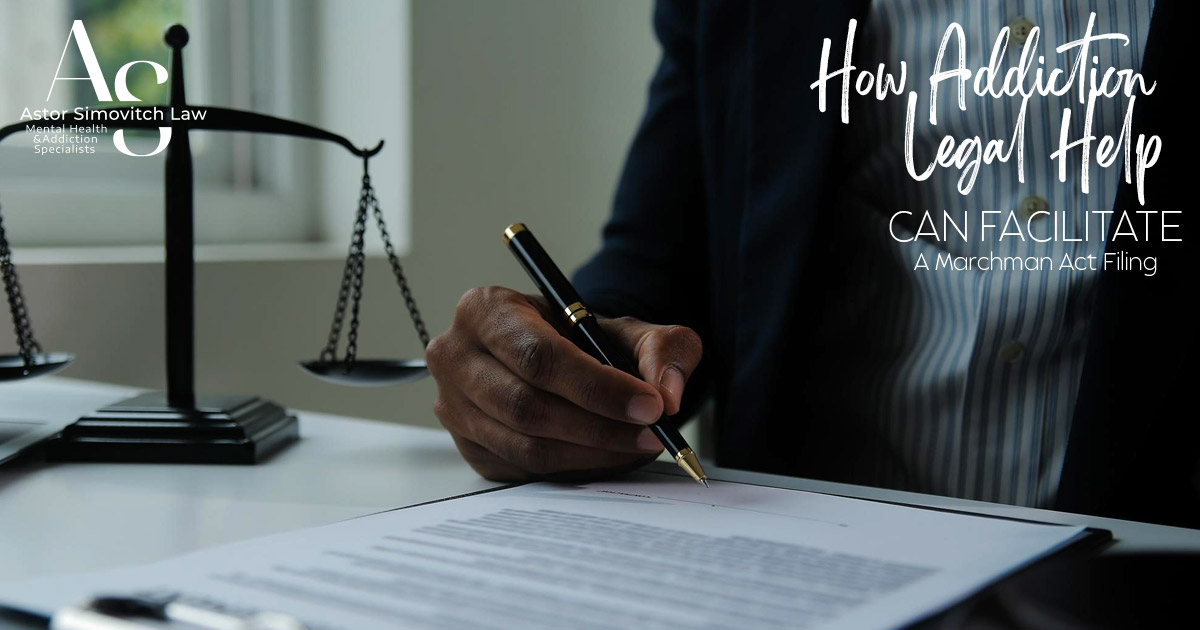How Addiction Legal Help Can Facilitate A Marchman Act Filing

Watching a family member suffer in the grips of addiction is incredibly distressing and can leave you feeling helpless and overwhelmed. You want to support your loved one and help them overcome their substance abuse issues, but where do you begin? Thankfully, in Florida, those with family members struggling with addiction can access legal help to facilitate a life-saving intervention known as a Marchman Act filing.
What Are The Signs Of Addiction?
You may be wondering whether your loved one has reached the stage where some kind of intervention is necessary. Although only a qualified professional can confirm whether someone has a substance abuse disorder, there are certain signs you can look out for to help you decide whether it’s time to take the next step and access addiction legal help. These include:
- Your loved one is exhibiting personality changes, such as increased agitation or irritability;
- They frequently have bloodshot eyes, bloody noses, or flushed cheeks;
- They sometimes get the shakes, or have slurred speech;
- Their behavior is erratic, they have no routine, or they frequently make last minute changes to their plans;
- If they are of school or college-going age, they frequently miss classes and are performing poorly when this wasn’t an issue before;
- They are frequently running out of money or facing financial difficulty when they weren’t previously;
- They are spending time with new and unfamiliar friends; or behaving in a secretive way;
- They have noticeable and unexplained weight loss or weight gain; and
- They are failing to practice personal hygiene and are neglecting their appearance, e.g. they have bad breath or body odor, or their skin is breaking out when previously it didn’t.
These are just a few changes to look out for, and there are other signs that are likely to occur depending on the particular substance your loved one is addicted to. If you think your loved one is exhibiting many of these signs, it may be time to seek legal help for their addiction.

How Can Legal Help Make A Difference In Addiction Cases?
Generally, medical and therapeutic interventions are the primary means by which addiction is treated. However, people who are battling addiction are often unable to recognize that they have a problem in the first place and fail to take advantage of the treatment options available.
In 1993, Florida legislators recognized that there was a dire need for a legal process that would allow families to get their loved ones struggling with addiction the help they need. The legislature recognized that addiction is a widespread public health issue and that setting out formal processes for getting people into treatment when they can no longer make good decisions for themselves would allow many lives to be saved. This is how the Marchman Act was born. It is now the primary legal tool used to help people with addiction in Florida.
What Is A Marchman Act Filing?
The Marchman Act essentially sets out a court-supervised process to compel someone who is suspected of having a substance abuse disorder to undergo an involuntary assessment and treatment. In Marchman Act proceedings, a concerned person – such as the parent, spouse, sibling, child, or partner of the individual struggling with addiction – petitions the court to order that the person be taken into custody by law enforcement and delivered to a treatment center for assessment, stabilization, and treatment, following a treatment services hearing (this is called a ‘petition for involuntary treatment services’). Since addiction law is complex, you will likely need legal help to bring a successful petition.
If the criteria for a successful petition are met, the person will be assessed, which is typically a three (3) to ten (10) day process. At this time, they will also receive emergency treatment if necessary. If the petition is successful, the person can be ordered to undergo treatment for their addiction for up to three months, following a treatment services hearing.
If you are uncertain whether a Marchman Act filing is the appropriate intervention for your loved one, an experienced attorney can explain your options for accessing addiction legal help.

What Are The Criteria A Marchman Act Filing Must Meet?
The Marchman Act sets out strict criteria that must be met before a petition for involuntary treatment services will be granted. Specifically, there must be a good faith reason to believe that the person suspected to have an addiction is impaired due to substance abuse, and:
- They no longer have the power of self-control in relation to their use of drugs (or alcohol); and
- They are unable to recognize that they need treatment for a substance abuse disorder and cannot make a rational decision in this regard; or
- There is a real risk that they will harm themselves or others if not treated.
To prove that these criteria have been met, your petition must be accompanied by evidence of your loved one’s addiction and the severity thereof. Medical records, sworn testimony from friends, family, or colleagues, a psychologist or social worker’s report, and any other documentary evidence that demonstrates the person is substance abuse impaired, and no longer in control of their drug use, must be included. You will also need to provide sworn testimony regarding your loved one’s condition. Your loved one will have the opportunity to address the court after the treatment services hearing has been conducted, and thereafter the court will decide to either grant or dismiss the petition for involuntary treatment services.
What Are The Benefits Of A Marchman Act Filing For Those Struggling With Addiction?
Deciding to access legal help for your loved one’s addiction is a big decision, and you may be worried about whether you are doing the right thing. You can take solace in the fact that countless families use the Marchman Act every year to help their loved ones break the vicious cycle of addiction and experience the miracle of recovery.
There are many first-rate treatment facilities in Florida. Getting your loved one to spend some time in one so that they can heal, be properly looked after, and receive the psychological and medical care that they need is an important first step to helping them recover from a substance abuse disorder. If their addiction is severe and they need to remain in a treatment facility for longer than 90 days, then your attorney can help you file a further petition requesting an extension of their stay in treatment.
Astor Simovitch Is Here To Provide You With Compassionate Legal Help During Your Loved One’s Addiction Crisis
At Astor Simovitch, we understand how stressful it is trying to navigate a loved one’s addiction crisis. Our mission is to use our legal expertise and experience to help families who have exhausted all other options to get their loved ones into treatment and on the road to recovery.
Our team of compassionate Marchman Act attorneys will help you to initiate a life-saving Marchman Act intervention, and will also put you in touch with our highly qualified care team to develop an effective treatment plan for your loved one. Contact us today at 561-419-6095 to arrange a consultation.